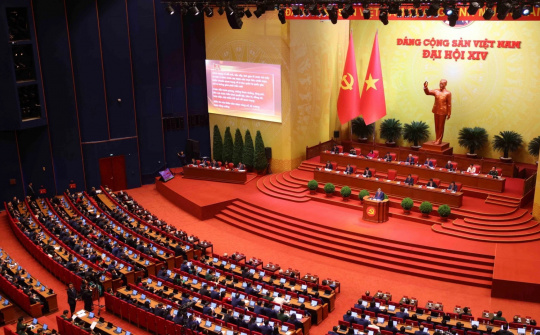VNHNO - The National Assembly (NA) deputies discussed the results of the two-year implementation of Resolution No. 76/2014/QH13 on accelerating sustainable poverty reduction by 2020, on September 17.
The discussion, which is part of the ongoing 27th session of the NA Standing Committee, was chaired by NA Chairwoman, Nguyen Thi Kim Ngan.
Delegates gave comments on a Government report on the results of two years of implementing the resolution, presented by Minister of Labour, Invalids and Social Affairs, Dao Ngoc Dung.
According to statistics, the rate of disadvantaged households in the whole country during 2015-2017 decreased by 1.59% per year, exceeding the target set from 1-1.5% per year. In disadvantaged districts, by the end of 2016, the rate of poor households in these locales was 44.93%, decreasing by 5.5%, while the figure by the end of 2017 was 39.56% (down by 5.5%), resulting in an average decrease of 5.43% per annum, meeting the set target by the NA.
The report also showed that by the end of 2017, the rate of poor households in communes facing extreme difficulties decreased by 3-4% compared to 2016. So far, eight districts have escaped from poverty among 64 poor districts under Resolution 30a, in addition to 14 districts entitled to the support policies under Resolution 30a towards overcoming the difficult situation.
Minister of Labour, Invalids and Social Affairs, Dao Ngoc Dung, delivers a Government report on the results of two years of the implementation of Resolution No. 76/2014/QH13 on stepping up sustainable poverty reduction by 2020. Photo: Quochoi.vn
A preliminary verification report presented by Head of the NA’s Committee on Social Affairs, Nguyen Thuy Anh, emphasised that the Committee backed the Government's assessment related to the important results achieved in 2017 and 2018.
She said that the Government, the Prime Minister and other relevant ministries and localities have brought their achievements and experience into full play in order to drastically manage and strengthen their efforts to accomplish a large amount of work to operate the National Target Programme on Sustainable Poverty Reduction, thus maintaining the results that reached the NA’s set targets and effectively controlling the risk of falling into poverty again.
However, the NA Committee stated that the poverty reduction achievements are not truly sustainable. By March 2018, though there were eight out of 64 districts under Resolution 30a to escape poverty and 14 out of 30 districts have benefited from the resolution’s mechanism for those escaping from difficulties, 29 districts have been added to the list of poor districts during 2018-2020. Twelve provinces saw a significant increase in the percentage of those falling into poverty again (up from 0.03% and above), even though several localities have favourable conditions for socio-economic development.
Discussing at the session, the participants suggested further clarifying the application of a multi-dimensional approach to poverty and the causes and responsibilities of the relevant units in the limited settlement of residential and production land, while discussing issues on policy integration and coordination among localities.
The deputies proposed that the NA and NA Standing Committee allocate sufficient funds to implement the National Target Programme on Sustainable Poverty Reduction in 2019 and 2020; pay additional attention to urgent tasks in the field of poverty reduction, especially in addressing the shortage of housing and health indicators; and to supplement capital to the Vietnam Bank for Social Policies to deploy credit programmes in a timely and effective manner.
NA Chairwoman Nguyen Thi Kim Ngan calls for exploring new solutions to suitable poverty reduction. Photo: Quochoi.vn
Concluding the discussion, NA Chairwoman Nguyen Thi Kim Ngan urged to promote State management over poverty reduction work, stressing the need to promote propaganda to raise public awareness on the work, which needs the joint efforts of the local authorities and communities without solely relying on the State budget.
She also asked to explore new solutions to suitable poverty reduction, while replicating effective poverty eradication models.
Poverty alleviation is not a responsibility of the State, the Government or any ministries, sectors, agencies or organisations, it is a common task of the whole political system, in which the main focus is to care for policy beneficiaries, the senior legislator stated./.


.jpg)
.jpg)



